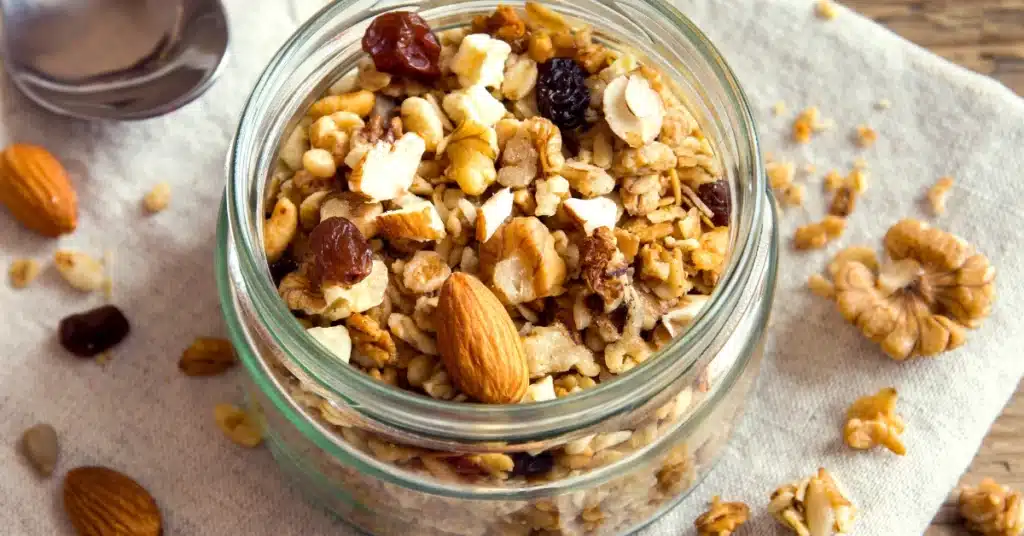Foods That Cause Heavy Periods: What Helps and What Doesn’t
The food you eat can affect your periods and the intensity of the blood flow.
Many women experience heavy periods, which can be uncomfortable for them.
The prevalence of heavy menstrual bleeding in America was 38.9%, and every 1 out of 5 experienced heavy periods.
If you, too, have heavy periods, you can alleviate the problem by changing your diet.
This article will inform you how some foods impact period flow, foods that cause heavy periods, and foods to include in your diet or avoid for better menstrual health.
How can some food affect period flow
Diet and menstruation have an intricate relationship.
The nutrients that you consume through your food affect your menstrual cycles.
Some foods increase the body temperature, which affects the period flow.
Healthy hormone levels are crucial for healthy periods.
Certain foods high in refined carbohydrates and sugar, like pasta and white bread, can disturb the hormonal balance in your body and cause heavy periods.
Also, some food contains Estrogen-like compounds that can cause menstrual irregularities.
Foods rich in omega-3 fatty acids, vitamin D, and calcium can also help reduce bad PMS symptoms.
What foods cause heavy periods
Some foods or beverages that cause heavy periods are:
Alcohol

Alcohol harms the liver and hormonal balance and can potentially cause severe menstrual symptoms and heavier period flow.
It can make you bleed more by increasing your Estrogen level.
Beetroot
If you want a heavier flow, you will benefit from eating beetroot.
It has a high iron content, which increases the blood flow.
Full-fat dairy
Some dairy products, like full-fat dairy ones, usually have arachidonic acid in high levels, adding to period cramps and flow.
These dairy products, with their high fat content, can disrupt hormonal balance and contribute to heavy periods.
Ginger and honey
The emmenagogue effects of ginger and honey can induce heavy periods.
Ginger consists of blood-thinning properties which can impact the period flow.
Honey may increase menstruation flow by increasing body temperature.
If ginger and honey are consumed together, the impact of ginger will be accelerated in enhancing the bodyâs internal heat.
Emmenagogues are substances that can stimulate period flow.
Any food or herb having emmenagogue effects mean it might stimulate menstruation by stimulating blood flow in the uterus and pelvic area
Processed foods
Fast food, ready-to-eat food packages, and microwave meals are highly processed foods.
The trans fats and artificial additives that they contain can result in inflammation in the body.
The inflammation can enhance your discomfort and also trigger heavy menstrual flow.
Sugar

Too much sugar consumption causes insulin spikes and impacts hormone levels.
The hormonal imbalance because of the sugar spike can lead to heavy periods and severe PMS symptoms.
Soy
Phytoestrogens present in soy products can have Estrogen-like effects on the body.
Consuming too many soy-based products can also lead to heavy periods by creating hormonal imbalances.
Foods to eat if you have heavy periods
In addition to knowing what food causes heavy periods and which foods to avoid, you should make dietary alterations to include period-friendly foods.
If you have heavy periods, you need foods that can reduce heavy flow and help you manage your cycle.
Therefore, remember to opt for food that contains high amounts of calcium, iron, and protein.
Fruits
Fruits, especially bananas, berries, and citrus fruits, can improve menstrual health.
The essential vitamins and minerals they provide also help ease menstrual symptoms.
If your heavy periods are because of PCOS or any other reason, ensure your vitamin C intake through fruits like mangoes, pineapple, and papaya.
These fruits will help your body to absorb iron better.
Leafy greens
During heavy periods, you must eat food that helps replenish the lost blood.
Therefore, you must intake iron-rich leafy green vegetables such as broccoli, bok choy, kale, and spinach.
Lean protein
Protein consumption is important because it reduces cramps and supports muscle health.
But it is better to avoid red meat as it has excess fat and eat fish, especially fish with bones.
You can also eat chicken or tofu, which are excellent natural iron and protein sources.
Nuts and seeds

Nutrients help in reducing inflammation and balancing hormones.
Therefore, eat nutrient-dense foods like almonds, chia seeds, and flaxseeds.
Nuts and seeds contain healthy fats, which can help maintain a healthy hormonal balance.
Whole grains
Whole grains provide essential nutrients and contain fiber, which helps to stabilize blood sugar levels and regulate hormonal balance, which might cause heavy periods.
They also contain complex carbohydrates that steadily supply energy without blood sugar spikes.
Therefore, it is suggested that you include whole grains like brown rice, oats, and quinoa in your diet.
Conclusion
Your diet plays a significant part in the intensity of your menstrual flow.
Maintaining a good diet is crucial for normal menstruation because some foods can lead to heavy periods.
In contrast, others can help you regulate your flow.
By including the correct foods in your regular diet, you may find relief from heavy periods and minimize any discomfort.
While choosing what to eat for or during heavy periods, give more importance to foods that are anti-inflammatory and high in nutrients.
Heavy menstrual flow can be managed by developing the habit of eating food items like bok choy, broccoli, fish with bones, lean meat, low-fat dairy products, nuts, and tofu.
More importantly, you must avoid foods that increase your symptoms, like alcohol, salty foods, and white rice.
Foods you should also avoid are caffeine, processed, and sugar-laden items.
It is also recommended to check with your healthcare provider for a better diagnosis and advice.
Frequently Asked Questions
Which foods should I avoid if I have heavy periods?
There are many unhealthy foods that you should avoid if you experience heavy periods. Some of these are foods containing sugar and refined carbohydrates like pasta and white bread, alcohol, salty foods, red meat, and coffee. Instead, prioritize nutrient-heavy foods like whole grains, fruits, leafy green vegetables, nuts, and seeds
Can I permanently get rid of heavy periods by changing my diet?
No, only dietary alterations are not enough to get permanent relief. However, a healthy diet works excellently to improve the symptoms. Consult a gynecologist for a personalized and comprehensive treatment plan.
Can you reduce heavy periods through exercising?
Exercising is beneficial for menstrual health and may also combat the risks of heavy periods. Working out balances the hormones, reduces stress levels, reduces the intensity of blood flow, and helps reduce menstrual cramps.
Are there foods that can stop heavy periods?
Yes, some foods can help in stopping or reducing heavy periods. If you need a healthier period cycle, prioritize nutrient-heavy foods like whole grains, lean proteins, fruits, leafy green vegetables, nuts, and seeds. Additionally, avoid caffeine, sugary, and processed food.






